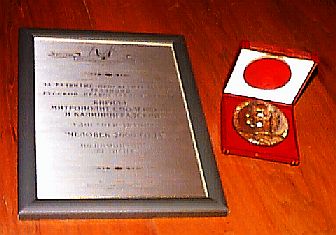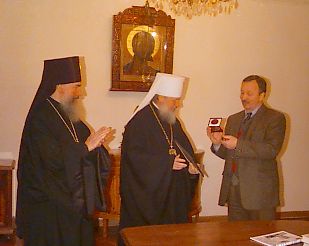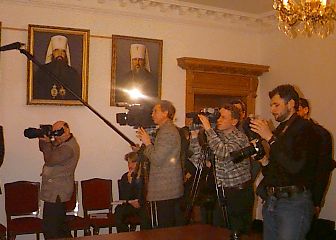Metropolitan Kirill wins the Man of the Year prize
4.01.2001 · English, Архив 2000
METROPOLITAN KIRILL WINS THE MAN OF THE YEAR PRIZE
 Metropolitan Kirill of Smolensk and Kaliningrad was presented with the Man of the Year in Religion prize in a ceremony on December 28 at the Department for External Church Relations of the Moscow Patriarchate. His Eminence has gained this high public recognition for his work for the development of educational traditions in the Russian Orthodox Church.
Metropolitan Kirill of Smolensk and Kaliningrad was presented with the Man of the Year in Religion prize in a ceremony on December 28 at the Department for External Church Relations of the Moscow Patriarchate. His Eminence has gained this high public recognition for his work for the development of educational traditions in the Russian Orthodox Church.
The national Man of the Year prize was established by the Russian Biographical Institute eight years ago. Its Experts Board, which includes distinguished Russian public figures and leading scientists and artists, declare new winners annually in the areas of religion, politics, economics, science and education, culture, military-industrial complex, medicine, small and innovative production, commonwealth, and sports. Among the winners in 2000 are Patriarch Alexy II of Moscow and All Russia, President Putin, Central Bank President V. Geraschenko, Academician L. Bokeria, Academician J. Alferov, chairman of the Russian Cinematographers Union N. Mikhalkov, musician Yu. Bashmet, tennis player M. Safin, and other outstanding personalities of the 20th century Russia.
Metropolitan Kirill has won this prize for the second time. He was first made the Man of the Year in 1993 for his peacemaking efforts.
 The diploma and the winner’s badge were presented to His Eminence by S. Rybas, director of the Russian Biographical Institute and editor-in-chief of the Who Is Who in Russia. Addressing the gathering he said: “This year we have become witnesses to the intense and manifold ascetic efforts of His Eminence Kirill for the development of dialogue between the Church and society and the strengthening of Russian Orthodoxy’s positions in the country and the world. The fact that the Jubilee Bishops’ Council adopted the social concept of the Russian Orthodox Church, which was developed under the immediate leadership of His Eminence Kirill, points to the Church’s desire to give an exhaustive and timely response to the challenges of time. And society is grateful to the Church for such steps. All this points to the high level of church-society and church-state relations and to the great contribution that Orthodoxy has made to the common cause of building new Russia”. He assessed as outstanding the religious educational work Metropolitan Kirill has carried out in the mass media. He also commended the metropolitan’s active and courageous civic position and his role in the peaceful settlement of the armed conflicts in the Balkans and Chechnya and earlier in overcoming the internal political crisis in 1993. He said in conclusion that “all these socially significant actions of His Eminence Kirill add up to the image of a truly outstanding hierarch of the Russian Orthodox Church who carries out his ascetic service on the right hand of His Holiness the Patriarch”. Metropolitan Kirill was presented with a commemorative medal with an image of Peter the Great and inscription: “I do not seek my own glory, the good of Russia is above all”.
The diploma and the winner’s badge were presented to His Eminence by S. Rybas, director of the Russian Biographical Institute and editor-in-chief of the Who Is Who in Russia. Addressing the gathering he said: “This year we have become witnesses to the intense and manifold ascetic efforts of His Eminence Kirill for the development of dialogue between the Church and society and the strengthening of Russian Orthodoxy’s positions in the country and the world. The fact that the Jubilee Bishops’ Council adopted the social concept of the Russian Orthodox Church, which was developed under the immediate leadership of His Eminence Kirill, points to the Church’s desire to give an exhaustive and timely response to the challenges of time. And society is grateful to the Church for such steps. All this points to the high level of church-society and church-state relations and to the great contribution that Orthodoxy has made to the common cause of building new Russia”. He assessed as outstanding the religious educational work Metropolitan Kirill has carried out in the mass media. He also commended the metropolitan’s active and courageous civic position and his role in the peaceful settlement of the armed conflicts in the Balkans and Chechnya and earlier in overcoming the internal political crisis in 1993. He said in conclusion that “all these socially significant actions of His Eminence Kirill add up to the image of a truly outstanding hierarch of the Russian Orthodox Church who carries out his ascetic service on the right hand of His Holiness the Patriarch”. Metropolitan Kirill was presented with a commemorative medal with an image of Peter the Great and inscription: “I do not seek my own glory, the good of Russia is above all”.
In his response Metropolitan Kirill expressed gratitude for the high public recognition, saying, “The title I have been honored with is purely symbolic, of course. Symbols, though, play an important role in our life. Thus, as a hierarch of the Russian Orthodox Church I have every reason to regard this award as an indication that the Church, having come out of a social ghetto in which she was held for long decades, has found herself on the limelight of public life and has managed to carry out dialogue with society in a worthy way. This is what I have been dreaming of. For it is my profound conviction that the Church cannot carry out her service of witness in contemporary society without such a dialogue”.
Speaking about the work of the Department for External Church Relations he directs, His Eminence Kirill noted that his department worked for the Church to occupy a worthy place in the life of Russian society and on the international arena. Through the present award, the winner emphasized, a high appraisal is given to the efforts of a large team of people serving in the sphere of external church relations.
 Metropolitan Kirill received warm congratulations on the award from representatives of the church and secular public. The ceremony was broadly covered by the mass media. Answering the question from journalists concerning the lessons that the people and the Church should draw from the outgoing century, Metropolitan Kirill said:
Metropolitan Kirill received warm congratulations on the award from representatives of the church and secular public. The ceremony was broadly covered by the mass media. Answering the question from journalists concerning the lessons that the people and the Church should draw from the outgoing century, Metropolitan Kirill said:
“I believe that a serious analysis of the events of the outgoing century is yet to be made. But it is my profound conviction that the pre-Revolutionary Church bears a certain responsibility for what happened in the beginning of the 20th century. If the place of the Church in the then Russian society were different, probably the bloody tragedy of the Revolution would not have happened. Of course, it is not only the Church that is guilty for the place she occupied for historical reasons. Above all, the then state system is also guilty. But the main tragedy in the 20th century Russia happened to a large extent because the Church was not the spiritual leader of the nation, in the full sense of this word. This was why the people fell into the abyss of revolution and stained their hands with blood in the fratricidal civil strife. I think we must study the experience of not only the 20th century, but also that of previous centuries, so that the Church may learn to build basically new relations with the people, society and state. I am firmly convinced that the Church should not seek secular power, that she should not have state control levers, nor should she be part of the state machine. For her calling is to be always the conscience of her people”.
